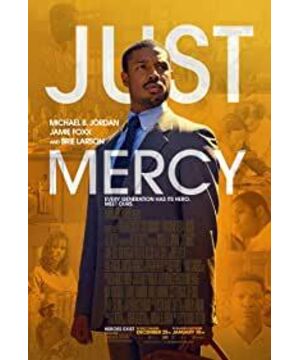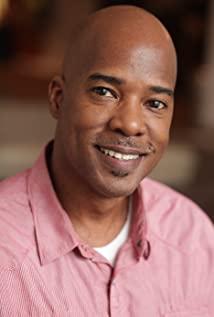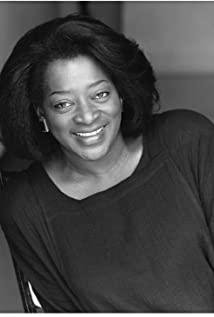Three and a half...
One of the feelings after watching "Justice Mercy" is that it is more than the best. "Justice Mercy" is adapted from the autobiography of a real person, which makes the theme of the story more realistic. Of course, we can also find many advantages. But in the same way, there are some shortcomings in this movie, which leads to room for improvement in the viewing experience. This time, let’s talk about "Justice Compassion."
(1) Film adaptation of real events, focusing on restoring VS which is the essence?
"Justice's Mercy" is adapted from the best-selling book "Justice's Mercy: Suffering and Salvation in American Justice" written by American lawyer Brian Stevenson. At the beginning of the film, the black protagonist who graduated from the Harvard Law Department gave up a high-paying career and became a free legal adviser on death row inmates. I thought the movie would be rolled out in a grand manner, telling the protagonist’s efforts to improve the American criminal justice system. Unexpectedly, "Justice Mercy" always revolves around an unjust case, to show the historical significance of the redress of this unjust case with a small view.
Before discussing "Justice Mercy", I would like to talk about the creative orientation of movies adapted from real events. Most of the real adaptations will have the characteristics of both directions, focusing not only on the restoration of the real event, but also on the artistic expression of the film. But in any case, after all, the tendency can be seen. Which is more important, authenticity or artistry? From my point of view, it might be better to strengthen the artistry. If the emphasis is on authenticity, then the film is in no way comparable to the reporter interview program. On the contrary, if the film is more artistic and impresses the audience, it will not only let the audience understand the real event spontaneously, but also have a greater influence. If the film extracts the essence of the theme, the spirit of the characters, etc., the effect is better than simple restoration.
A real adaptation of the movie I particularly like is "Call Me Number One." When people looked at him differently, he was strong and optimistic to overcome difficulties. In the first half of the movie, the job hunting experience is interspersed with memories, giving people a deep understanding of why the character wants to be a teacher; in the second half of the movie, the love line and the career line go hand in hand. Coupled with the character lines of the protagonist, mother, father, and lover, the story content of "Call Me Number One" is very rich, and the spirit of the characters is deeply rooted in the hearts of the people. This is what I think is the ideal effect of a real film adaptation.
In "Justice Mercy", the film narrative structure is basically flat and straightforward, focusing on restoring the true events. In terms of tendencies, "Justice Mercy" pays more attention to authenticity. To some extent, this reduces the charm of "Justice's Mercy". In my next discussion, I will use "Call Me Number One" as a reference for the ideal level, and expand it from two aspects.
(Two) more than the following
As mentioned in the previous article, "Justice Mercy" has both advantages and disadvantages, so let's discuss "more than the following" first. First of all, in the concept of the film, "Justice Mercy" has its own unique value. This movie is based on "rehabilitation of an unjust case" as the core plot. The injustice of the case is that the black arrested did not commit murder and was forcibly convicted by the police and the court. However, when the protagonist of the lawyer appealed for his grievances, he faced numerous obstacles. The police and the court turned a blind eye to the evidence and even threatened the protagonist many times. This is enough to reflect the imperfection and corruption of the criminal justice system.
Not only that, the reason why black people are convicted is that the police are also under pressure from public opinion, and public opinion is full of racial prejudice. Careful observation will reveal that the confrontational power of "Justice Mercy" is quite rich, from the police to the court, public opinion, and ideological concepts, and the handling is quite subtle. At the same time, the film's disclosure of this true fact helps to awaken people's insistence on judicial justice and vigilance against racial discrimination. This is the meaning of the movie.
In order to strengthen this effect, "Justice Mercy" also pays great attention to the rendering of the atmosphere. On the one hand, the film progressively announced the "unfair treatment". In the beginning, the unfair spearhead was directed at the police, who ignored the evidence and framed innocent people; then, the unfair spearhead was directed at the courts and public opinion. They did not look at the truth, but only wanted to make themselves safe and feel good. This "injustice" not only strengthens the confrontation force, but also continuously advances the plot.
On the other hand, the movie also portrays the grievances of some death row prisoners very well, which helps to promote the plot. "Justice Mercy" mainly mentions three death row prisoners, each of whom has its own grievances, and one of them was also executed. When the death bell approached, these condemned prisoners still lived strong and hopeful. This can't help but feel heavy. To some extent, I think the portrayal of death row prisoners is even better than the protagonist.
In addition, the entire plot of "Justice Mercy" is relatively complete, progressive, and the storytelling is methodical. These are "more than the following." Many comments mentioned that the performance of "Justice Mercy" is very stable. Whether from the structure of the story or the performance of the actors, the whole is implicit and stable, and it is difficult for you to pick out what is wrong. Compared with some unsuccessful films, the stability of "Justice Mercy" is an advantage. But looking at it from another angle, this kind of "stability" has also become a limitation. It makes "Justice's Mercy" not good enough, and it has a feeling of "success and failure."
(3) Insufficient comparison
From the perspective of a lawyer's autobiography, "Justice Mercy" really clarifies everything that should be explained. However, as far as this incident is concerned, "Justice Mercy" still leaves a lot of blank space. These blanks make the movie story still incomplete. The plot of "Justice Mercy" is closely tied to one point, that is, the protagonist of the lawyer helps the death row prisoner to avenge justice, and all the confrontational forces revolve around the action of "requiting justice." If "Justice's Mercy" is based on the life of the characters and tells the redress of multiple cases, then the problem is not big. Because just different unjust cases are enough to complete the story, and the movie is also centered on characterizing. However, "Justice Mercy" is not like this.
Since "Justice Mercy" has chosen to focus on the incident, then the whole incident should be explained clearly. The lawyer's protagonist's redress is only an explanation-this black condemned person is not the murderer. In fact, the whole event should look like this:
When an 18-year-old girl in the town was murdered in broad daylight, the police did not solve the case for a year. Under pressure from public opinion, they planted an innocent black man. The court also quickly sentenced to death. The death row inmate thought he was dead, but when a Harvard lawyer showed up, things took a turn for the better. After the unremitting efforts of lawyers, the death row was finally withdrawn...
When I was watching a movie, I always wondered who was the murderer of the girl? Why has the police never solved the case? Why is the court's decision so arbitrary? At the middle of the movie, I was expecting the movie to finally reveal the darker forces. For example, the murderer has a special identity, and the police officers want to protect him, just like "Internet Mystery Trails"; or, to dig deeper into the truth of the girl’s victimization, which may involve the shady of the police or the courts, just like "Hurricane Rescue". "That's it. However, it was not until the end of the film that I realized that this was just the incompetence and laziness of the police, and the case was closed due to pressure from public opinion. Combined with the plot of "Justice Mercy", it feels like the detective Sherlock Holmes has ruled out a suspect, and then it ends without continuing to solve the case.
Of course, "Justice Mercy" is not a reasoning film after all, but a legal story. Regardless of the truth about the murderer, the police and the courts refused to accept the truth on the grounds that it would make society fall into fear again, and public opinion wanted blacks to go to jail. The logic of this view has its social and historical background, so there is no need to talk about it. The point is that "Justice Mercy" does not show this kind of pressure from public opinion, which makes the police and the court's approach appear stubborn and rigid. In fact, the film only needs to portray the prosecutor, and the sub-plot derived from it can express the pressure of public opinion. If it goes well, it can further create an atmosphere of racial discrimination and increase the tension of the plot. If there is one more plot, the story will become more complete.
In addition to the incompleteness of the story, the portrayal of the characters in "The Mercy of Justice" cannot be said to be very successful. In the movie, the wronged death row is very well portrayed in the struggle, fear, indifference, and anger of death. In "Justice Mercy," the wronged death row did not appear as an individual, but as a group. For the image of this group, the portrayal of "Justice Mercy" is clearly in place.
However, the characterization of the protagonist in "Justice Mercy" is not very deep, and he has even become a tool to promote the plot. First of all, why does the protagonist want to give up a high-paying career and go to provide legal aid to death row prisoners for free? The motivation explained in the movie is not very essential, and it does not reveal the profound impact of certain experiences on the protagonist. So that when the protagonist encounters setbacks, it is difficult to empathize and understand the reasons for his persistence. On the contrary, in "Call Me Number One", the protagonist's reason for having to be a teacher is a direct hit, because a principal once changed him through a special education, letting him understand the meaning and value of education. Therefore, when the protagonist encounters a setback, the audience knows that he will not give up.
Secondly, "Justice Mercy" does not show how the protagonist overcomes setbacks well. The impression is that the film seems to focus more on restoring events, but ignores the portrayal of the protagonist. In fact, there are a few dramatic scenes in the movie, which may be used to show the protagonist's attitude towards setbacks. By showing how the protagonist overcomes setbacks, we can see the protagonist’s principles, beliefs, emotions, personality, character, and other aspects of information, so as to better understand the character's image. And this is the characterization. It's a pity that "Justice's Mercy" didn't dig deep.
Among them, the most impressive thing is that the protagonist was stopped by the police when he was driving, and he was forced to submit by guns, and then searched for the protagonist's car. This scene shows that the consequences of the protagonist's continued death are very dangerous, and this experience will inevitably affect the protagonist's mentality. However, in the next scene he was transferred to prison. He continued to work without mentioning this experience directly with anyone. When encountering this kind of threat, it is impossible to be unwavering. Usually, it will cause self-doubt: Should I continue to persevere, even if I will die? Is it worth it? If you can continue to dig into the protagonist’s emotions, motivations, and beliefs, it will be more conducive to portray the protagonist’s image. I have to say that this great scene is a bit wasted.
In addition, the ending of "Justice Mercy" is also somewhat preaching and blunt. When the protagonist stood in front of the judge, he gave a more sensational speech, discussing right and wrong and morality. It can be noted that the judge did not respond to this statement. Obviously, these words are not for the judges, but for the audience, which is somewhat of a drama. At the same time, the prosecutor suddenly turned to the protagonist camp at the end of the movie, which seemed somewhat abrupt. The film does not give a detailed reason for the prosecutor’s defection, and the story is not logically coherent. This is also where "Justice Mercy" is slightly inadequate.
Concluding remarks
The adaptation of real events does not mean that they are limited to "absolute truth." As long as the theme, spiritual core and general history of the true story are retained, there are still many places for artistic processing in other parts. There are many ways to enrich the story by designing subplots, or adopting more flexible and smooth narrative techniques, or going deep into the protagonist's heart, or strengthening the confrontational power, or increasing the irony effect. The key point is to continuously and deeply study the true story and extract the most essential part. Only with this can we let go of the adaptation. All in all, "Justice Mercy" now "compared with the above and the insufficiency is more than the below", it seems a pity to some extent.
Welcome to pay attention to the Toutiao account and the public account of the same name (Fugue Film Review)
View more about Just Mercy reviews











